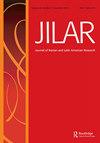E-Learning y empoderamiento de las trabajadoras del hogar centroamericanas en Barcelona en tiempos de COVID-19: el caso del CITE
IF 0.3
0 HUMANITIES, MULTIDISCIPLINARY
Journal of Iberian and Latin American Research
Pub Date : 2021-09-02
DOI:10.1080/13260219.2021.2030283
引用次数: 0
Abstract
ABSTRACT This article focuses on the case of Central American female domestic and care workers in Barcelona, many of whom live and work as undocumented migrants and are unaware of their rights and the mechanisms to exercise them. The Trade Union Confederation of Workers’ Commissions, from its CITE association, has vast experience in training foreigners through the delivery of face-to-face workshops on labor rights that have enabled their empowerment. With the COVID-19 emergency, the face-to-face workshop format switched to virtual for the first time, through the use of Google Meet (formerly Hangouts Meet) application, allowing mobile learning (m-learning). The results presented show how this new training modality, despite the challenges it poses to organizers in terms of technological and human resources, not only achieves the empowerment of the benefitted migrant women, but also improves the accessibility of this vulnerable group to training.新冠疫情期间巴塞罗那中美洲家庭佣工的电子学习和赋权:CITE的案例
本文主要关注巴塞罗那的中美洲女性家政和护理工作者的案例,她们中的许多人作为无证移民生活和工作,不知道自己的权利和行使这些权利的机制。工人委员会工会联合会(Trade Union Confederation of Workers’committees)在通过举办面对面的劳工权利讲习班培训外国人方面拥有丰富的经验,使他们能够获得权力。在COVID-19紧急情况下,通过使用谷歌Meet(原Hangouts Meet)应用程序,面对面的研讨会形式首次转为虚拟形式,从而实现了移动学习。研究结果表明,尽管这种新的培训模式给组织者带来了技术和人力资源方面的挑战,但它不仅实现了对受益的移民妇女的赋权,而且改善了这一弱势群体接受培训的机会。
本文章由计算机程序翻译,如有差异,请以英文原文为准。
求助全文
约1分钟内获得全文
求助全文
来源期刊

Journal of Iberian and Latin American Research
HUMANITIES, MULTIDISCIPLINARY-
CiteScore
0.60
自引率
0.00%
发文量
22
 求助内容:
求助内容: 应助结果提醒方式:
应助结果提醒方式:


